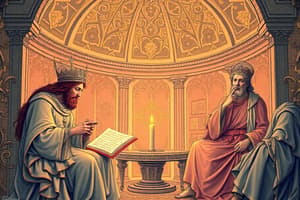Podcast
Questions and Answers
What does St. Augustine refer to the relationship between the body and the soul as?
What does St. Augustine refer to the relationship between the body and the soul as?
- Spousal connection (correct)
- Divine intervention
- Natural appetite (correct)
- Mutual dependence
According to St. Augustine, what is necessary for man to understand eternal truth?
According to St. Augustine, what is necessary for man to understand eternal truth?
- Relationship with God (correct)
- Philosophical teachings
- Religious rituals
- Personal experience and reason
What causes sin or evil, according to St. Augustine?
What causes sin or evil, according to St. Augustine?
- Worldly temptations
- Acts of freewill (correct)
- Human ignorance
- Divine punishment
What is the first priority for love according to St. Augustine's philosophy?
What is the first priority for love according to St. Augustine's philosophy?
Which statement best encapsulates Descartes' famous philosophical principle?
Which statement best encapsulates Descartes' famous philosophical principle?
What was Rene Descartes' contribution to modern philosophy?
What was Rene Descartes' contribution to modern philosophy?
What does St. Augustine believe is the ultimate source of real happiness?
What does St. Augustine believe is the ultimate source of real happiness?
What leads to disordered love, according to the teachings of St. Augustine?
What leads to disordered love, according to the teachings of St. Augustine?
What is essential for gaining true knowledge according to the explanation provided?
What is essential for gaining true knowledge according to the explanation provided?
How is personal identity related to self-consciousness?
How is personal identity related to self-consciousness?
According to the explanation, what does the 'self' consist of?
According to the explanation, what does the 'self' consist of?
What does the dynamic nature of the self involve?
What does the dynamic nature of the self involve?
What separates the soul from the physical body in the provided explanation?
What separates the soul from the physical body in the provided explanation?
What concept is illustrated by the comparison between a sleeping person and a clock?
What concept is illustrated by the comparison between a sleeping person and a clock?
What is the relationship between the conscious self and free will according to the explanation provided?
What is the relationship between the conscious self and free will according to the explanation provided?
Which aspect is considered to be part of the spiritual realm according to the explanation provided?
Which aspect is considered to be part of the spiritual realm according to the explanation provided?
What is the central argument proposed by Paul Churchland regarding the concept of self?
What is the central argument proposed by Paul Churchland regarding the concept of self?
Who coined the term neurophilosophy?
Who coined the term neurophilosophy?
What principle governs the conscious self according to Freud?
What principle governs the conscious self according to Freud?
Which of the following best describes the philosophy of neuroscience?
Which of the following best describes the philosophy of neuroscience?
Which level of the mind is described as demanding immediate satisfaction and not constrained by societal expectations?
Which level of the mind is described as demanding immediate satisfaction and not constrained by societal expectations?
According to the Churchlands, what do concepts such as belief and desire do?
According to the Churchlands, what do concepts such as belief and desire do?
What do Churchland's views suggest about feelings and thoughts?
What do Churchland's views suggest about feelings and thoughts?
What does the superego primarily depend on according to Freud's theory?
What does the superego primarily depend on according to Freud's theory?
What is the main focus of cognitive neurobiology as discussed by the Churchlands?
What is the main focus of cognitive neurobiology as discussed by the Churchlands?
What is the primary goal of every individual according to Freud's psychoanalytic theory?
What is the primary goal of every individual according to Freud's psychoanalytic theory?
How does Freud describe the relationship between the ego and the id?
How does Freud describe the relationship between the ego and the id?
What area of study does the philosophy of neuroscience NOT explicitly incorporate?
What area of study does the philosophy of neuroscience NOT explicitly incorporate?
Which statement reflects a potential misconception about the Churchlands' view of self?
Which statement reflects a potential misconception about the Churchlands' view of self?
What aspect of the mind does the iceberg metaphor illustrate in Freud's theory?
What aspect of the mind does the iceberg metaphor illustrate in Freud's theory?
What does the subconscious serve as according to Freud?
What does the subconscious serve as according to Freud?
Freud's dualistic view of self includes which two aspects?
Freud's dualistic view of self includes which two aspects?
What does Hume argue about the existence of the self?
What does Hume argue about the existence of the self?
Which two entities does Hume identify in our experience?
Which two entities does Hume identify in our experience?
What are impressions according to Hume?
What are impressions according to Hume?
How does Hume describe the 'fictional self'?
How does Hume describe the 'fictional self'?
What happens to one's perception when they sleep, according to Hume?
What happens to one's perception when they sleep, according to Hume?
What is the relationship between ideas and impressions?
What is the relationship between ideas and impressions?
Why does Hume reject the existence of self beyond empirical experience?
Why does Hume reject the existence of self beyond empirical experience?
What is one implication of Hume's argument on personal identity?
What is one implication of Hume's argument on personal identity?
Flashcards are hidden until you start studying
Study Notes
St. Augustine's Views on Human Nature
- Human nature consists of two realms: divine truth and sinfulness.
- God is the source of all reality and truth; through mystical experiences, humans can know eternal truths.
- Understanding of the world correlates with knowledge of God; closer knowledge of God leads to a better understanding of reality.
- Sin is a product of human free will, and moral goodness is achievable only through God's grace.
- True happiness is found in loving God first; disordered love leads to misplaced happiness and chaos.
René Descartes' Philosophy
- Descartes is known for the phrase "cogito, ergo sum" or "I think, therefore I exist."
- True knowledge is achieved by doubting everything, including one's own existence.
- The act of thinking identifies one's existence and personal identity as a conscious being.
- Distinguishes between the non-material, immortal self (soul) and the material, mortal body.
- Advocates for the independence of the soul and body; each can exist separately.
- Asserts that the conscious self is governed by reason and God's will, contrasting with the physical body's adherence to natural laws.
David Hume's Critique of Self
- Hume challenges the notion of a permanent self; asserts the existence of only "impressions" and "ideas."
- Impressions are immediate sensory experiences, while ideas are derived from those impressions.
- Claims the self is a fictional construct created to unify mental events; lacks real existence.
- Argues that perceptions vary and that the self does not persist after death or in states like sleep.
Sigmund Freud's Dualistic Self
- Freud conceptualizes the mind as divided into three components: id, ego, and superego.
- The conscious self (ego) operates on the reality principle, mediating impulses with societal norms.
- The unconscious self (id) seeks immediate gratification based on the pleasure principle.
- Superego embodies moral principles learned from societal expectations.
- Visualizes the conscious mind as the visible part of an iceberg, with the unconscious acting as the submerged, repressed area influencing behavior.
Paul and Patricia Churchland's Neurophilosophy
- Churchlands propose that the concept of self arises from brain activities; self is fundamentally a product of neural processes.
- They emphasize that traditional terms like belief and desire misrepresent the realities of mind and self.
- Patricia Churchland coined "neurophilosophy," exploring the intersection of neuroscience and philosophical inquiries about the mind.
- Argue that identity and self are rooted in the biochemical and physiological workings of the brain, shaping thoughts, feelings, and behaviors.
Studying That Suits You
Use AI to generate personalized quizzes and flashcards to suit your learning preferences.



